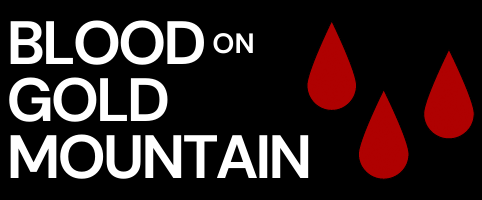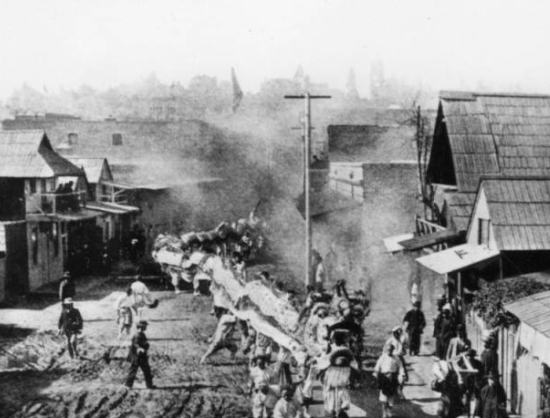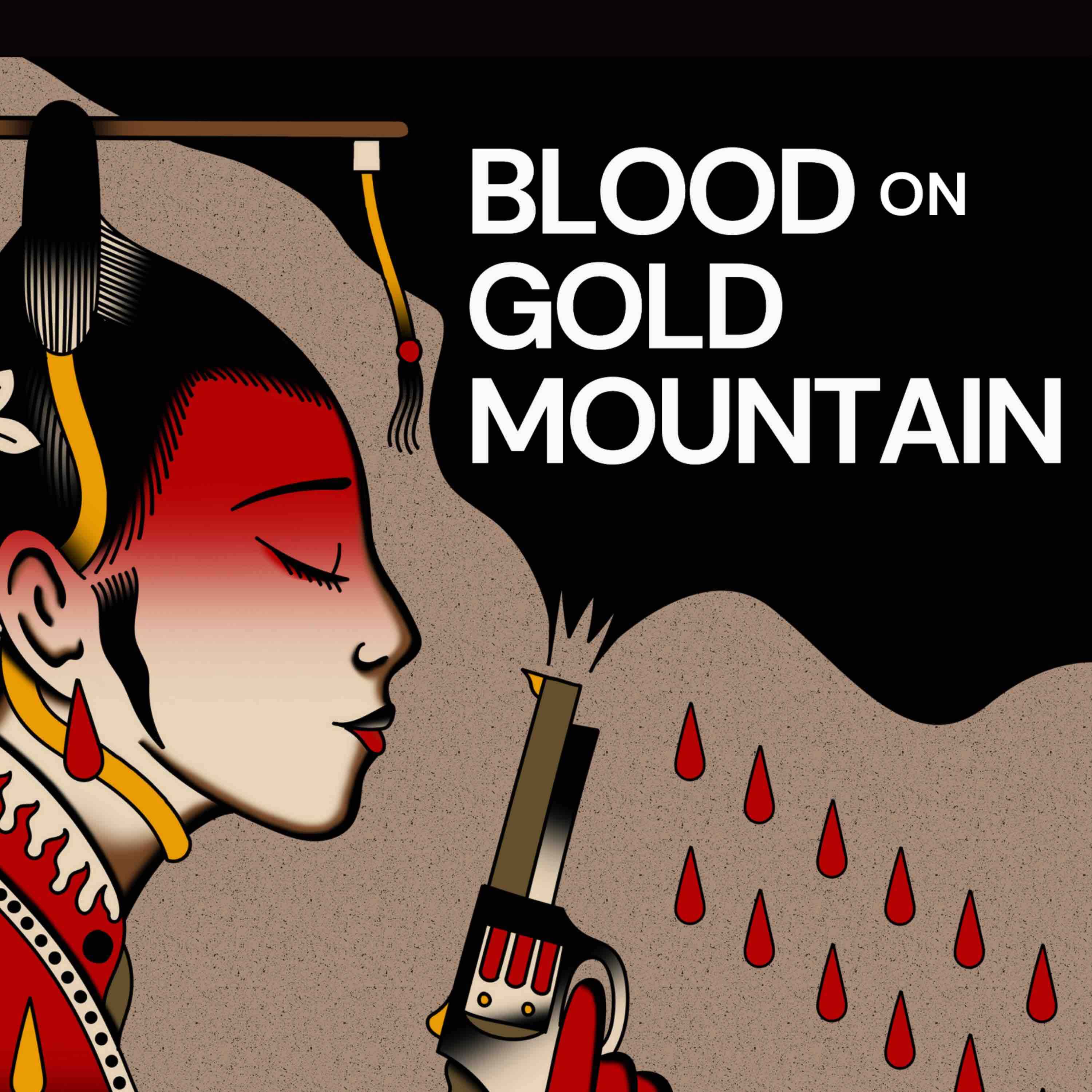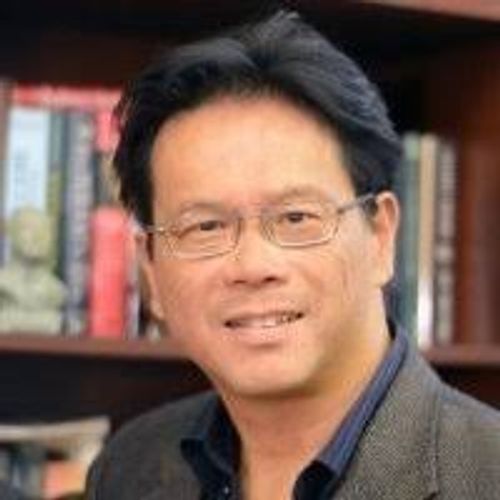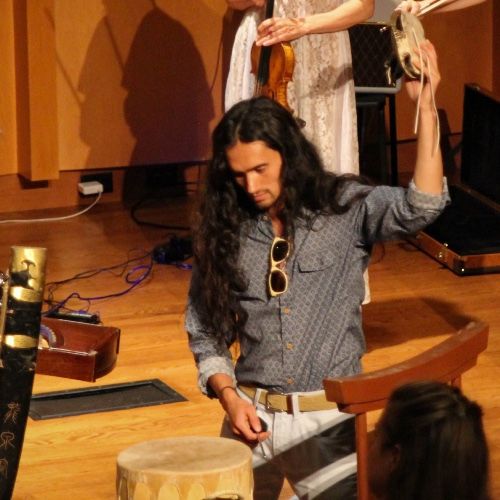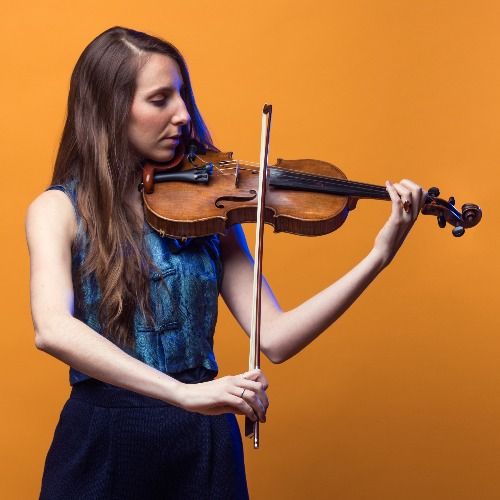The Widow
This episode addresses one of the most important and neglected aspects of early Chinese immigrants’ experience in California.
Relations between Chinese immigrants and their Anglo counterparts were not always hostile. Despite the fact that there were few women in California when Chinese men started arriving, sometimes relationships would form. The only references to such relationships that we have in the primary sources have to do with the Anglo establishment’s attempts to prevent them. Some examples include rhetoric associating Chinese men with drug use and debauchery.
See pg. 30 of this article from Harvard's online archive.
Other sources refer to legal measures taken to prevent Asian men from marrying white Women.
INTERRACIAL MARRIAGES AMONG ASIAN AMERICANS IN THE U.S. WEST, 1880- 1954
Sources from the early 20th century show that white women who married Asian men would lose their citizenship and become social outcasts. However, prior to the Chinese exclusion act of 1882, sources are scarce. Because of this, our writer, Micah Huang, turned to popular fiction accounts from the time in order to get a sense of what these characters’ experience might have been.
Forbidden Liaisons
The most compelling story of this kind that Micah was able to find was “Poor Ah Toy” by Mary Mote published circa 1870.
See PDF Page 5- The Third Sex by Robert G. Lee
Poor Ah Toy tells the story of a Chinese man who is hired as a servant by a white woman named Fanny Siddons. Over the course of the story, it becomes clear that Ah Toy has fallen in love with Fanny. Eventually she gets engaged to a white man named Jeremiah Ward, whom Ah Toy confronts, prompting Fanny to fire him. At the end of the story, Ah Toy hangs himself. Fanny marries Ward but continues to visit Ah Toy’s grave for the rest of her life.
The events in this story are informed by the sensibilities and constraints under which white women authors at the time were operating. On the face of it, it is a cautionary tale about what happens when non-white servants forget their place. However, there are sub-textual clues to a deeper, darker meaning. First off, the use of the word “Toy” in the titular character’s name is not coincidental. While it would have been totally unacceptable for a white author (especially a woman) to explicitly refer to sexual contact between a white woman and a Chinese man, the events in the story suggest and evoke a secret or “illicit” sexual relationship between Fanny and Ah Toy.
The power dynamic between the two characters is an inversion of standard portrayals of male/female relations in American popular literature at the time; a quiet rebellion on the part of Mary Mote which is reflected in Ah Toy’s name and the fact that he is ultimately disposed of like a used plaything. His defiance and Fanny’s ultimate penitence represent a nod to the impossibility of his situation–something to which Mote’s female readers might have been able to relate in 19th century America.
Star-Crossed Lovers
When Micah encountered Mary Mote’s story during his research, he was immediately struck by the similarity between the names Ah Toy and Ah Choy. This was reinforced by the frequency with which Anglo people mispronounce Chinese names. Micah began thinking about what kind of woman would be a fitting romantic partner for a character like Ah Choy, and he arrived at an archetypal romance-on-the-edge, something along the lines of Romeo and Juliet or Bonnie and Clyde. The Wild-West setting lends itself to a particular kind of hard-bitten romance, and Micah was aware of the substantial parallels between the situations endured by Chinese men and white women in America from the 1850s to the present day.
Slowly, the story began to take shape. Micah found himself engaging with the material from “Poor Ah Toy” in a way that was equal parts re-telling and reclamation. He felt that the author Mary Mote had crossed over into forbidden territory, even if only in the realm of imagination. Here was a real woman from the time in which the story is set who on some level committed herself to this type of forbidden love, and Micah found himself reaching out, invoking her spirit, and letting it merge with his narrative voice to drive the story. As a result, the character of The Widow shares the names both of the author and of her creation, Fanny Siddons. Ah Toy became her Southern-accented mispronunciation of Ah Choy’s name. The Widow’s backstory and personality were driven by the spirit with whom Micah connected for this episode. On Micah’s end, they are a testament both to the tremendous hardships endured by women in the über-patriarchal American West and to the resilience that so many women showed in the face of that oppression. In this way, and others, Mary and Ah Choy are truly two of a kind.
In the original story, Jeremiah Ward represents Fanny’s re-entry into white society after her forbidden liaison. The Widow has no desire to follow that path. Instead, our version of Jeremiah Ward is a controlling, entitled, patriarchal figure who seeks to draw her back to Anglo society by force. As to the conclusion of the star-crossed romance? I guess you’ll just have to listen to the episode and see.
If you have questions, thoughts, your own family stories, or historical context to share, please send us a message at @bloodongoldmountain on Facebook or Instagram.
-----
Blood on Gold Mountain is brought to you by The Holmes Performing Arts Fund of The Claremont Colleges, The Pacific Basin Institute of Pomona College, The Office of Public Events and Community Programs at Scripps College, The Scripps College Music Department, and The Entrepreneurial Musicianship Department at The New England Conservatory.
Blood on Gold Mountain was written and produced by Yan-Jie Micah Huang, narrated by Hao Huang, introduced by Emma Gies, and features music composed by Micah Huang and performed by Micah Huang and Emma Gies. A special thanks to Rebecca Bays for her cello excellence, Kusuma Tri Saputro for the amazing artwork, Sheila Kolesaire for her critical PR guidance, Muqi Li for her brilliant guzheng playing, Rachel Huang for her editing prowess, and Evo Terra from Simpler Media Productions for his immense expertise and support.
-----
More details at bloodongoldmountain.com
Transcript
Previously on Blood on Gold Mountain: At a waypost owned by a Native American Elder, Yut-Ho told the harrowing story of the war and famine that tore her family apart and destroyed the village that she and Ah Choy used to call home. Then she learned of the terrible injustices inflicted upon America’s First Nations, and was confronted with a question that haunts immigrants and refugees the world over: Have we arrived in the promised land, or have we come out of the frying pan, and into the fire?
Hao:The next few days and nights passed in a kind of golden blur. As the carriage continued southward, the Valley grew wider and wider until the mountains had receded into a long, indistinct smudge that encircled the world. Far in the distance, Yut Ho could sometimes make out the flash of sun on a slow, looping river, but they sipped water from canteens, and kept to their course. As the land grew flatter, the streams that had criss-crossed their path north of Indian Camp disappeared. Everything was dry, suffused with a radiant emptiness so vast that in its presence, even time itself seemed small and insignificant.
They camped out in the open and Yut-Ho slept fitfully, her dreams filled with the dark and looming shadow of a man. Time and again she would awake only to find her dream embodied in the form of Ah-Choy or of the driver, silently standing guard against the backdrop of the numberless desert stars, and the round white moon.
It was not until the landscape abruptly changed, that Yut-Ho realized how far they had come. The distant smudge towards which they had been heading suddenly reared up like a green dragon, bristling with trees and full of the sound of running water. Looking around in all directions, Yut-Ho realized that they had arrived at the place where the valley’s western ridge curved sharply eastward, arching its ponderous way over and around until it finally collided with the colossal flank of the far-off Eastern ridge. Since their first night after leaving San Francisco, they had been travelling in this valley, but now they had reached the end, and their road began to climb towards a saddle in the hills beyond which, Yut Ho presumed, lay her future. As they mounted higher up the pass, the view from the window grew dizzyingly long. Yut Ho estimated the length of the arch at 50 miles, and its span, from ridge to glistening peaks, at twice that distance. The entire Sze Yup region, her ancestral home with its distinct tribe, language, and culture, would have fit inside that arch of the valley with room to spare.
As they ascended, the air grew noticeably cooler and the surroundings more green. Yut-Ho, whose body was still accustomed to the hot, humid weather of South China, shivered. “Was it much colder than this when you split up with your mining group?” she asked Ah-Choy.
It took a moment for her brother to respond. He had been staring out the window, stroking the scar on his cheek, and it was clearly an effort for him to pull himself back to reality.
“What? The mining group?
Yes, it was colder, I'm not sure how much. You get used to the cold, mining, because you have to stand in the freezing river at least half of the time. I did feel the cold, through, the night that I left. The group set off North and East, keeping to the high ground. I never saw any of them again, but I think it’s likely that they made it. They were a resilient bunch.
I went South, moving fast, and circled around the outskirts of the town. I needed to cause some kind of commotion, to draw the sheriff’s attention, but I couldn’t risk running into any dogs or energetic Gwailo who might stand a chance of catching me. In the end, I went with one of our old tricks from the village: I opened every paddock gate I could find along the first few miles of the Petaluma road. Then I walked back down the road towards Sonoma very slowly, and do you know what I did as I walked?”
Yut-Ho stared at him. “Don't tell me you were singing Gong-Gong’s Water Buffalo song.”
The two of them looked at each other for a moment and then burst out laughing.
“It's just like Gong-Gong always said,” cackled Ah-Choy. “No cow can resist the Water Buffalo song. By the time I got back to the outskirts of Sonoma, a hundred cows had wandered out of their open enclosures to follow the music. Well, maybe that's a little bit of an exaggeration, but it was a decent-sized little herd, all quietly swaying to the Water Buffalo song as they walked.
“I led them to a nice little patch of grass by the foot of a low ridge, which seemed to point southward toward the sea. When I stopped singing, the cows lost interest in me and began to graze. I climbed up under the trees and started making my way along the ridge top just as dawn was beginning to break. I was pretty sure that the missing cows would cause enough confusion to give the mining crew time to escape. However, I wasn't really sure what to do with myself! The men on the crew had taught me a bit of the Gwailo language, but it didn't seem likely that I'd be making any friends around those parts. The general feeling towards Chinamen isn't friendly, and as you may remember, my clothes were filthy and splattered with blood.
“Luck was with me though. As I continued southward, a heavy fog began to roll in. It filled the valleys to either side of me until I seemed to be floating in a sea of whiteness, with hilltops poking up here and there like islands. Ahead of me the ridge stretched into the distance, narrow, but clear.
“It was eerily quiet up there above the fog. In the distance, I thought I could hear the echoes of shouting voices. Perhaps it was the sound of 20 Gwailo ranchers searching for their music-loving cattle. Perhaps it was just ghosts. Once, I heard a rider gallop by in the same direction I was heading, but he didn't see me. The fog quickly smothered the echoes of his passage.
“I kept going in this way for a couple of hours, glancing eastward from time to time in hopes that the sun might break through the cloud cover and burn off the fog so that I could see the lay of the land. However, as the morning wore on, the sun showed no sign of appearing. In fact, the sky seems to be getting darker. It was as if heaven had changed its mind about the day and was trying to go back to twilight instead.
“This darkness made me uneasy. I was just beginning to look around for likely sources of shelter when several things happened, one after another. First the ridge ahead of me ended abruptly, plunging downwards and out of sight into the fog. Second, a sudden wind blew up from the Southeast, whipping my hair in my face. In less than a minute, the fog had blown off, revealing a long gentle slope that led from my feet right down to a gray and desolate shore. Third, with a terrific flash of lightning and a tremendous crack of thunder, the sky opened up and it began pouring rain.
“I was soaked to the skin with rivulets of rain pouring down my weather-stained clothes and washing away the blood of the man I had killed. As I walked down the bottom of the slope, I realized that the shore ahead was, in fact, a huge tidal plain, crisscrossed by streams of various sizes, and dangerously soft in spots. If I fell into a quicksand pit or mistakenly walked too far out to sea, I could easily be drowned when the tide came back in. On the other hand, the town of Sonoma would be up in arms, scouring the hills and thickets for rogue Chinamen to torture and hang for murder and cattle rustling. I was trapped.
“Harder and harder, the rain came down. It was getting darker every minute, except for the lightning bolts that stalked and strutted out over the bay like gods in battle. Suddenly, I noticed a tiny faint light off to my left- a dim, flickering sort of light that seemed to come and go as the wind threw sheets of rain across my line of sight. A will o'the wisp, I thought, a marsh light sent by the ghosts of other hapless drowned men to guide poor Ah-Choy down to his watery grave. But the rain was so thick, and the wind was so cold that I walked toward it anyway, putting one foot in front of the other as the tempest around me gathered force.
“I have no memory of that last walk, nor of how I reached the cabin. I don’t know why it was, that I decided to sit on the steps rather than knock on the door. Perhaps it was the ghost of the Gwailo I had killed playing tricks on me. Perhaps I was unwilling to face the hostility that I might well imagine to await me inside that dimly lit house, or perhaps I simply couldn't remember how to introduce myself in Gwailo and sat down to puzzle it out.
“Whatever the reason, I did not knock, but sat down on those low steps in the howling storm. There I fell asleep from sheer exhaustion. In that hopeless sleep, I caught a fever. Then, late in the evening after the storm had blown itself out, I was found lying there and dragged inside – by the Widow.
“What can I say about the Widow? She was 27 years of age with hair like honey and tiny crow's feet just beginning to show at the corners of her dark blue eyes. She took me in at my time of need, gave me food, and broke my fever even though I was a stranger, and a Chinaman at that. When I asked her why she had done it, she smiled and told me it was because she liked my face. It was an honest face, she said. I think her saying so brought out the honesty in me, because during the time I spent with her, I told her everything. I told her about the miners, the claim jumpers, and the man I had killed. I told her about Sze Yup, about the rebellion, and how I had sailed to Gold Mountain to escape from the Emperor’s men. I told her about mother and father, and about you and how I needed to come up with the money to send home, or you would starve. Eventually, I even told her how lonely and strange it was to be here in this place, reviled and persecuted in a land where the entire society claims to be founded on principles of equality and freedom.
“Of course, I didn't tell her all these things at once. Trusting a Gwailo-- even a beautiful, kind Gwailo who had saved my life-- took time, though I knew right away that there was something different about her. Even if I had wanted to spill my guts right away, I couldn't have done it. My command of the Gwailo language wasn't even half decent when I arrived at the Widow's house. Later, when I had learned enough to have what she called a ‘civilized conversation,’ she laughingly told me that when I first arrived, she had thought that I was speaking “China talk” to her, my accent was so thick.
Fortunately, there was a certain natural boldness and curiosity in both of our natures, and we found ways to communicate by looks, gestures, and touch long before I was able to hold a civilized conversation.
“How did she know that she could trust me? The same way I knew I could trust her. We were equals, each living in our own way on the fringes of society. The Widow and the Chinaman, fending for ourselves on the salt flat at the edge of the world. Our bodies were young, but our minds were shadowed and scarred by the hardness of the world, and so we came together in mutual recognition, blending our strangeness like yin and yang, like sand and sea.
“The Widow told me many things.
in the province of Virginia,:“Robert Siddons was a big, strong man. He used to force himself on Mary and beat her when he was drunk, which was often. He blamed her for their lack of children, and Mary protested, but she was secretly glad that no child had to endure such a terrible father.
“One night after a particularly long and violent bout of drinking, Robert passed out on the floor of the cottage and nothing Mary did could get him to move. Instead, she dragged him out onto the plain and left him there.
An hour later the tide came in, and he was drowned.
‘I gave a bad man to the sea,’ she told me, half joking. ‘And the sea brought me a good one in return.’ Then she drew me to her, and her embrace was just as irresistible as the tide.
We were kindred spirits, The Widow and I.
“In the years after Robert’s death, a few men from Sonoma had tried to win the favors of the beautiful young Widow. In particular one Jeremiah Ward, whose father owned the general store, made it known that he had designs on marriage, but Mary disliked Ward and his friends, all of whom frequented the saloons and whorehouses in town and none of whom, she assured me, was even remotely capable of ‘civilized conversation.’ Gwailo men behave as though they were Emperors, entitled to concubines and slaves. They are not bound to serve their clan or their elders; their society is dominated by men who respect nothing so much as their own strength. Gwailo women pay the price for their menfolk’s freedom. Even old, wise women with big families have lower status than their own sons in Gwailo society. To marry any of her rough and rowdy suitors would have put Mary’s fate into his hands, and that was not a risk that she was willing to take
“Fortunately for Mary, the ladies of Sonoma's church community made a point of sending her parcels of food from time to time, so she was able to sustain her solitary life on the seashore without any dependence on the Gwailo men. However, she kept Robert's old rifle on its rack above the headboard of her bed, always clean, oiled and loaded with fresh, dry powder.”
“We lived there together for a season, as the cold rainy winter gave way to the beguiling beauty of the Northern California spring. I fixed up an old boat and some nets that Mary had been keeping under the house, and I would ride down the lazy creek in the mornings and return as soon as I had caught much fish as we wanted to eat that day. It was a slow, gentle way of living, all drenched in sunshine and accountable to no one but Mary, whom I was eager to please. No matter what else might befall me, I will always be a lucky man, for that spring on the shore, The Widow and I were happy. I hope that someday you can be happy like that, even if only for a season. Even if only for a day.
One day after a long and unusually successful fishing expedition, I returned to find Mary pacing up and down the beach, tight lipped and tense. She ran over to help me pull up the boat, and then said, “Jeremiah Ward was just here.” I looked at her inquiringly, and she continued. “I thought I had made it clear to him that I didn't want to see his rangy form stalking round my property, but I guess he had a few drinks and forgot. Anyway, he came up knocking at the door while I was out back hanging up the line, and when I came around to see who it was, do you know what he said to me?”
I shook my head.
“No ‘good morning’ or ‘how de do ma'am’ or even a ‘hello.’ The ugly bastard, just points down at your boots, standing there by the door and asks me all accusingly, ‘whose boots are those?’
I glanced down at my feet, which were bare and dark against the pale sand.
“Well, I had more than half a mind to tell him it was none of his goddamn business whose boots they were, but I had left the gun inside, so I just said, ‘why those boots are mine, just like everything else around here, including that step you're tracking mud on.’”
“Then he did that thing that some men do when a woman is speaking and they just raise their voice and talk over her without waiting to hear what she says at all. He fairly shouted, ‘That there's a man's boot, and too new to belong to old Bob Siddons, dead these five years. No woman. That's a living man's boot, or I'm a Chinaman.’ I guess I was just mad at the sheer effrontery of him, because before I knew what I was doing I said, ‘you ain’t half a Chinaman, Ward. Not even close.” Then I turned and went around the back door to go get my gun, and when I kicked open the front door, the bastard had slunk off. But I'm worried Ah-Toy. (That was how she pronounced my name.) We’d best be ready for trouble.”
We were just sitting down to our supper when there came a loud knock at the door, and a rough voice called out for the Widow Siddons to open up, in the name of the law.
Without saying a word, Mary and I both looked at the heavy bolts that secured the cabin’s two doors. They were shot tight. We looked at each other. Then, very quietly each of us went to get their gun.
A second voice was speaking outside. “You bitch! You whore! I always knew you were a low down, good for nothing little minx, but I never--”
“Quiet, Ward,” said the first voice.
Then, “go ahead, Sheriff.”
A third voice, deeper and rougher than the other two now began to speak: “Widow Siddons. This is sheriff Watkins of the township and county of Sonoma. You are under arrest on charges of living in sin and consorting with Chinamen, the first count on the testimony of Mr. Jeremiah Ward and the second on evidence of this letter, confiscated from the Sonoma post office three days ago and bearing your signature as well as the unmistakable scratchings of the Chinamen on the pages within.”
Mary swore under her breath. She had posted the letter for me, along with some money she had made selling a bag of salt beef, which we no longer needed on account of all the fish I was catching. The letter was for you.
The sheriff droned on, “Sonoma is a civilized town, and any Chinaman found to be consorting with a white woman here will be hanged by the neck until dead in the name of common decency. I reckon the punishment for a white woman found to be consorting with a Chinaman is prison, but in your case, if you choose to cooperate with the law and assist with the capture of said Chinaman, you will be spared that indignity and instead be given over into the custody of Mr. Jeremiah Ward for safekeeping. The choice is yours. Now I'm going to count to 10 in order to give you time to unbolt this door and come out with your hands in the air. After that Deputy Morris will break the door–”
“The hell he will!” Interrupted Ward, “I'll break it down and go fetch her myself.”
The Sheriff sighed. “That's fine. Let him do it, deputy,” he said. There was a scuffling of feet outside as the two men changed places.
“One,” said the sheriff. “Two.”
Mary put the muzzle of her rifle right up to the tarnished brass keyhole, and fired.
Immediately, I leapt up and lifted aside the curtain from the front window. Ward had been standing with his groin directly in front of the keyhole. He had fallen backward and the deputy, obviously a green recruit with no real experience, had caught him under the arms as if keeping him upright could somehow stop the torrent of blood that was pouring forth from his shattered pelvis. I fired twice. The first shot lodged in the already half-dead Ward, but the second one hit the deputy at the base of his jaw and the two of them tumbled to the ground in a fountain of blood and shattered bone. Mary was reloading her rifle, slamming an enormous bullet down the barrel with the help of a long, thin metal ramrod.
The sheriff had retreated into the darkness and was yelling something I couldn't understand. I fired twice in the direction of his voice, and then caught my breath; not far from the bloody mass at the bottom of the steps, a torch lay where the deputy had unthinkingly dropped it in order to catch Ward as he fell.
Now the wooden steps, pitch-cured and dry from a month without rain, had caught, and the flames were beginning to lick up the side of the cabin. Mary shouted in dismay as I threw open the shattered windowpane and leaped out.
Bullets smacked into the wall planks behind me as I went. Snatching up the torch, I threw it as hard as I could in the direction of the gunfire and then began piling sand over the smoldering steps. It was like a bad dream-- my feet slipped in the dark, my hands felt too slow, and the sand ran through my fingers like water. All the while, Mary and the Sheriff kept on trading fire right over my head. Looking around. I saw that Mary was shooting not into the dark, but at the four horses that were tied to a huge driftwood log some 50 paces from the cabin. Already, two of them were down a third wounded while the fourth reared and rolled its eyes in terror.
Four horses?
Sometimes in the most extreme circumstances, you find yourself moved as though by some irresistible, external force that leaps into your body and acts in a way that you yourself would never have been able to do. Maybe it really is the ancestors, reaching out from the other world to intervene in human affairs. This was one of those times. I was taken, seized by some ghostly premonition, and twisted around just as the fourth rider, who had stolen silently around the corner of the house, brought his knife down right where the back of my neck had been moments before. The blade raked down the side of my face, and I leapt backward away from the fire, but my foot caught in the sand and I tumbled to the ground. Desperately I scrambled to my feet, but my height and weight betrayed me, and I slipped again. The fourth man was upon me, knife upraised like an avenging specter, and that was when Mary leaned her beautiful, fire-lit torso clean out of the window, rifle and all, and fired.
Suddenly the fourth man was gone, but at that moment, I saw the sheriff standing by the horses with his own gun raised. Without thinking, I sprinted towards him yelling curses in Sze Yup and Gwailo as I went. I saw his eyes widen, saw him take aim and, looking down the barrel of his revolver, heard the sharp, dry *click.* Then I was upon him, my own knife in my hand, and the sand ran black in the flickering light.
When the demon-work was done, I realized the fire on the steps was still burning. “Mary,” I shouted as I ran back across the pitted sand. “Mary come help me put out the fire!” It was getting bigger, creeping slowly up the wall, and I wasn't sure I could put it out by myself. We needed water, quick! “Mary, the bucket! We need the bucket! Mary!” There was no answer. All of a sudden, I felt terribly cold. I grabbed the twisted doorknob, remembered the bolt, rushed to the window, and leaped inside.
I think she saw me, at the very end. Maybe she smiled a little, or maybe it was just my imagination playing tricks on me. She had been hit right beneath the collarbone on her left side. I sat there on the floor of the cabin and held her until the flames and the choking smoke drove me out, and then I stood there on the beach and watched the fire through the blood and tears that covered my face, filling my vision with dancing rainbows of flame.
Then I pulled the boat out into the stream, rowed into the current, and was gone.
After that there's not much to say. I rowed back to Vallejo and caught a steamer back to San Francisco where I presented myself to the Heaven and Earth society as an enforcer and assassin of the kind the Gwailo call a “highbinder.’ They tested my skills, which were adequate, and they gave me this sword. When they asked me to pick a trade-name I chose Condor, a type of giant vulture native to this land. It felt appropriate. Soon enough, the jobs started rolling in, and I was able to start sending money again. That's it. That's how I've been making money these five years in Gold Mountain, to answer your question from the other day.”
Ah-Choy stopped speaking abruptly, and turned away to look out of the window.
Yut-Ho looked at her brother for a long time. Then she reached out and took his big scar-covered hand firmly between her small, strong ones. He continued to stare out of the window, unwilling or unable to face the compassion in her gaze.
But he did not withdraw his hand.
Emma:If you enjoyed the show and want to hear more, tell us in a review, and become one of our community backers at www.bloodongoldmountain.com/support. Remember to follow us wherever you listen to podcasts, and reach out with thoughts and questions on Instagram and Facebook at Blood On Gold Mountain. Episode 4, “Bride Price,” will be released on Wednesday May 5th. Blood on Gold Mountain is brought to you by The Holmes Performing Arts Fund of The Claremont Colleges, The Pacific Basin Institute of Pomona College, The Public Events Office at Scripps College, The Scripps College Music Department, and The Entrepreneurial Musicianship Department at The New England Conservatory. It is hosted by Hao Huang, Micah Huang, and Emma Gies, featuring original music by Micah Huang and The Flower Pistils. A special thanks to Rebecca Bays for cello excellence, Kusumatsaputro for the amazing artwork, Sheila Kolesaire for her critical PR guidance, Rachel Huang for her editing prowess, and Evo Terra from Simpler Media Productions for his immense expertise and support. Thanks for listening and see you next time.
